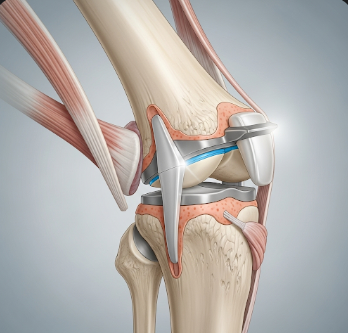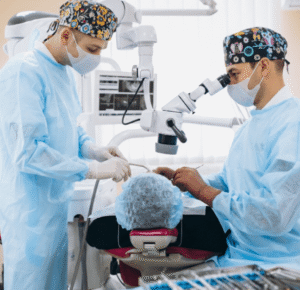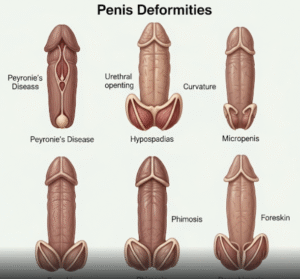Overview
Unicompartmental knee replacement (UKR), also called partial knee replacement, is a surgical procedure where only the damaged portion of the knee joint is replaced with an artificial implant, instead of the entire knee joint. This is usually recommended when arthritis or damage is limited to one compartment of the knee (medial, lateral, or patellofemoral).
South Korea is a global leader in joint replacement surgery, offering advanced robot-assisted techniques, minimally invasive approaches, and fast rehabilitation programs. Patients benefit from shorter hospital stays, quicker recovery, and high surgical success rates.
What is Unicompartmental Knee Replacement?
Unlike total knee replacement (TKR), where the entire knee joint is replaced, unicompartmental knee replacement only targets the damaged part of the knee, preserving healthy bone, cartilage, and ligaments.
This makes the procedure less invasive and allows for a more natural knee motion compared to TKR. Korean hospitals specialize in precision-guided UKR, ensuring accurate implant placement and long-term durability.
What are the Benefits?
✔ Less invasive than total knee replacement
✔ Faster recovery time with smaller incisions
✔ Better preservation of natural knee function
✔ Less post-operative pain and reduced blood loss
✔ Shorter hospital stay (often 2–3 days in Korea)
✔ High success rate with modern implants
Procedure Details:
1) How should I prepare for Unicompartmental Knee Replacement?
- ● Medical evaluation: X-rays, MRI, or CT scans to confirm arthritis is limited to one compartment
- ● Pre-surgery instructions: Stop certain medications (e.g., blood thinners) as advised
- ● Fasting: No food or drink for 6–8 hours before surgery
- ● Rehabilitation planning: Arrange for walking aids and a support system at home
- ● Korean hospital advantage: Preoperative 3D planning and robotic navigation systems ensure precision
2) What happens during the procedure Unicompartmental Knee Replacement?
- ➤ Anesthesia: Either general or spinal anesthesia is used
- ➤ Incision: A small cut is made over the affected knee compartment
- ➤ Damaged tissue removal: Diseased cartilage and bone are carefully removed
- ➤ Implant placement: Artificial components (metal and plastic) are fitted to resurface the joint
- ➤ Robotic assistance: Widely used in Korea for maximum accuracy
- ➤ Duration: Usually 1–2 hours
3) What happens after a Unicompartmental Knee Replacement?
- ● Recovery room monitoring: Until anesthesia wears off
- ● Early mobilization: Walking with assistance typically begins within 24 hours
- ● Hospital stay: 2–3 days in most Korean hospitals
- ● Rehabilitation: Physiotherapy begins immediately for improved knee strength
- ● Follow-up: Stitches/sutures are removed within 10–14 days
Risks / Benefits
✔ Benefits:
- ✦ Faster recovery than TKR
- ✦ Lower complication rates
- ✦ More natural joint function
- ✦ Less scarring and blood loss
⚠ Risks (though uncommon):
- ➔ Implant loosening or failure over time
- ➔ Progression of arthritis to other parts of the knee
- ➔ Infection or blood clots
- ➔ Rare need to convert to total knee replacement in the future
Recovery and Outlook
- ➤ Return to daily activities: Usually within 3–6 weeks
- ➤ Full recovery: 3–6 months with consistent physiotherapy
- ➤ Implant longevity: Modern implants last 15–20 years
- ➤ Korean outcome: Studies show over 95% success rates with advanced surgical systems
- ➤ Rehabilitation programs in Korea: Hospitals provide intensive physiotherapy and hydrotherapy for optimal recovery
When To Call the Doctor
Seek medical help if you notice:
- ⚠ Fever or chills after surgery
- ⚠ Redness, swelling, or discharge from incision site
- ⚠ Severe pain not relieved by medication
- ⚠ Difficulty moving or bearing weight on the leg
- ⚠ Sudden chest pain or shortness of breath (possible clot)
Best Korea Option / Process
South Korea is one of the top destinations in the world for knee replacement surgeries, including UKR. Patients choose Korea for its robotic technology, highly experienced orthopedic surgeons, and cost-effectiveness compared to Western countries.
Why Korea is the Best Option:
- 🌟 Robotic-assisted partial knee replacement widely available
- 🌟 Shorter hospital stays and enhanced recovery protocols
- 🌟 Multilingual support for international patients
- 🌟 Affordable compared to the US/Europe with equal or better results
- 🌟 Dedicated joint centers in major hospitals
Top Korean Hospitals for UKR:
- ✅ Seoul National University Hospital (Orthopedic Surgery Dept.)
- ✅ Asan Medical Center
- ✅ Severance Hospital (Yonsei University)
- ✅ Samsung Medical Center
- ✅ Jaseng Hospital of Korean Medicine (integrated rehabilitation care)
✅ Quick Highlights Recap
- ➤ Unicompartmental knee replacement replaces only the damaged part of the knee
- ➤ Less invasive, quicker recovery, and more natural function than TKR
- ➤ Risks are rare, benefits are significant
- ➤ Full recovery in 3–6 months with long-lasting results
- ➤ Korea offers world-class orthopedic care with robotic precision













